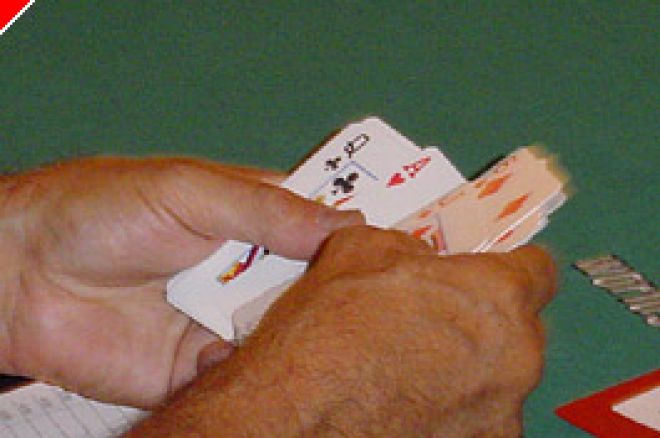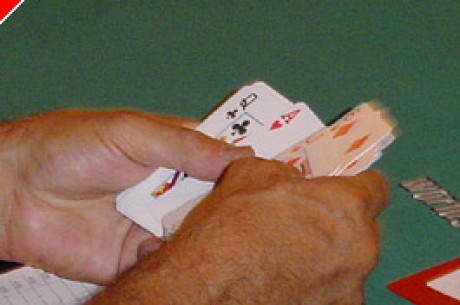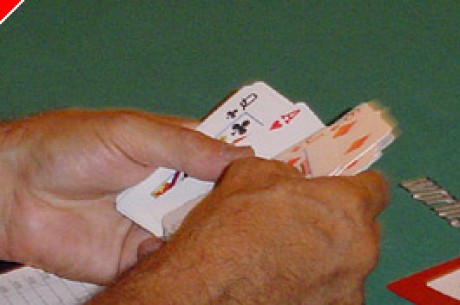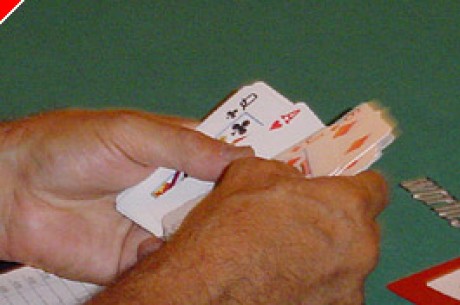Stud Poker Strategy - Trips

I know poker players who dismiss my attempts to teach people how to play trips. They point out that it's hard to lose money with three-of-a-kind. To an extent, they have a point. It's hard to lose, since they usually win regardless of how you play them. Trips are very strong.
Even so, these critics betray a misconception of how one wins or loses money in poker. The key is not just to win and not to lose a hand, but to maximize ones winnings with the hands you win and to minimize the losses on the hands you lose. So if you're winning with trips but not winning what you should be winning you're actually losing money in the long run...
Here are some thoughts that should help you maximize your winnings when you win with trips (and also limit your losses when you lose with them).
The odds that you'll get trips on your first three cards are 425 to one against. That's actually not as infrequent as it may sound. Though it's 85 times less frequent than being dealt a pair, it is only about seven times as likely that you'll have a pair of Aces on the deal.
In a typical ten hour session in a casino, for example, with 25 hands dealt per hour, on average, trips will be dealt about five times. If you play weekly, you will be dealt trips in your first three cards, on average, thirty or so times during that year of play.
It's uncommon but it's hardly rare.
You must consider a number of factors when you decide whether to play your trips for a raise or a call. There are even some very unlikely circumstances when you should fold your trips.
In general, knowing nothing else about the game, its players, position, the size of the trips, your image, the image of your opponents, the number of people who have already called the bring in, whether anyone has yet raised the bring-in, recent betting history, the size of the ante relative to the small bet, or the size of your stack or your opponent's stack, — knowing none of that, the best move with trips is to call. You do not want to knock everyone out and only win the antes and bring-in with a hand as strong as trips. Generally speaking, trips are so strong that you want to seduce people by playing your hand more weakly than its true strength dictates.
But, fortunately for the good player, you always know something about the game that can help you decide when it makes sense to deviate from this standard play - when it makes sense to raise. There is no way for any strategist to predict the exact circumstances you will face. Every situation in poker is unique. But there are some general considerations that can guide your play.
In general, if you have reason to believe that your raise has only a minuscule chance of knocking out all of your opponents, then you should raise. Those reasons include the following possible scenarios:
1. You are against a number of opponents who usually call the initial completion, regardless of their holding.
2. A number of players have already called the bring-in.
3. Your opponents' cards seem to be live.
4. You have a low door card.
5. Higher door cards remain after you.
6. No one has yet raised the bring-in.
7. You have a loose and aggressive image.
8. The game, in general, is loose and/or wild.
9. You have been caught ante stealing recently.
10. You have won a few uncontested pots on Third Street by raising and having your opponents all concede.
11. For whatever reason, some bad players at the table don't like you.
12. One of your cards is dead.
Here is an example of those scenarios combining to make a raise make sense.
Let's say that you are playing $5/10 against four very poor, passive and loose opponents. You've won a couple of hands in a row. Though you tend to be a tight player, your recent action at the table hasn't shown you to be especially conservative - since you've been most of the last few hands. There are three other players who are generally solid but not terribly strong. Your four poor opponents almost always call a bet if the pot is raised. You are dealt (3h3s)3d. The 2s, held by one of these players, is to your left. There are a few face cards and an Ace out. Three players call the $2.00 bring-in. Two of those callers are bad. It is your action.
Go ahead and raise the pot to $5.00. You are virtually certain to get at least a couple of callers. The two bad players who almost always call a completion have an added incentive this time. They have already put in 2/5ths of a bet. It will only cost them $3.00 more to call. That's a bargain. Even if they figure you have a strong hand, they'll call. So too might the bring-in and the other player. They're probably not even thinking too hard about what you have. They haven't dubbed you a rock. Maybe they put you on pocket pair. More likely they don't put you on anything. They're just thinking about whether they should call. They see others call. They follow along. You'll probably take Fourth Street with two or three opponents. You may even get re-raised. If you do, just call.
Your raise has done a number of things that tend to help you. First of all, the astute observer is less likely to believe you have trips. He's thinking that since you raised you probably have a pair in the hole or a pair of 3s and an Ace or King kicker. He's thinking that as a good player you're unlikely to play a super strong hand strongly.
The weakies aren't thinking. But they are reacting in a way that helps you. By putting more money in the pot as a result of calling your raise they are committing themselves to it more deeply than they would be if you only called the bring-in. For them, the more money they put in early, the more reason they have to play the hand to its completion. Since you are the likely winner, this is a good thing for you -as they are more likely to stay in for every subsequent round of betting no matter how your hand improves and theirs fails to improve.
Since the weak players are more likely to stay in the hand, the pot will become larger, enticing the strong players to stay in because of the excellent pot odds and implied odds that the pot will offer them. Your raise thus has a compounding effect that further helps you.
Your raise is also important because it will drive out some players who might otherwise play for only a call. You don't want a table full of callers, as that will diminish your chances of winning the pot. Your trips are roughly an 85% to 15% favorite against a pair. Against three opponents - two with pairs and the third with a straight draw, you're still a 55% favorite over the field. But against. six opponents with decent hands like low pairs, straight or flush draws, you're only going to win about 25% of the time.
Here's another situation for you to consider.
You have (KhKd)Ks. You are at a loose table. There are some maniacs who nearly always raise - and who rarely back down from a raise. You recently were in a raising war with them that you won when your pair became two pair and they're pair didn't improve. The bring-in is to your right. An Ace, held by a maniac, is to your left. Another maniac has a Jack. No Aces, Kings or Jacks are out.
Go ahead and complete the bring-in.. Expect the Ace to re-raise. The Jack may even call him or re-re-raise the Ace. In any regard, just call the raise or the re-raise.
In this situation, you are taking advantage of your image and the style of your opponent. You are raising as if to say that you are challenging his manhood. It is the standard move in this game - to raise with a big card. It doesn't even mean a pair. His re-raise is to be expected because that's what he does. Once again, you are building the pot to seduce your opponent on later streets.
These two examples not withstanding, most of the time you will not raise. Don't go crazy with this. For example, consider the following hand.
You have the same hand as in the prior example, three kings. But none of your opponents have an Ace. Don't raise with the Kings. Though there's a good chance you'll be called by someone - since the game is generally loose, there's at least some small chance that your maniac opponents will have absolutely nothing and will fold. They may not even have the tools for a bluff or semi-bluff. Your raise will stand some chance of knocking out them and all of the other players. Take the safer and more conventional route and just call. You have virtually no chance of having a free card hurt you. Since you're the highest upcard, it's nearly certain that no matter what card any of your opponents receive, you're going to have the highest hand on Fourth Street. They'd have to have had a pair of Aces in the hole, just called with them, and then caught a miracle third Ace for you to fall behind. That's highly unlikely. So go ahead and call.
Here's another situation for you to consider.
You have (9s9d)9c. The bring in is a few seats to your right. You have a relatively tight image. A solid player with a Jack raises the bring-in before the betting action gets to you. A couple of players have premium cards after you. What do you do?
Don't raise. Just call. The player with the Jack would think that you had him beat, since both he and you are solid. He'll figure you might well have at least a higher pair in the hole. The players after you are unlikely to call a double bet unless they have a premium pair. It's 5:1 against them having a pair - even longer odds that they have a premium pair. By the time the field folds around to the original raiser he's thinking that it's not going to be profitable for him to take you on until the River - so he's likely to release his hand (he is tight after all) and let you win it. You don't want that.
Here's another consideration - albeit not a major one. If, for whatever reason, you seem to be disliked by a number of people at the table (not a good situation to be in but it happens) be ever so slightly more likely to raise than normal - all other factors being equal. This is because players tend to respect the bets of people they like, and to disbelieve and challenge the players they don't like. This isn't universally true - and it shouldn't tend to outweigh the other factors I've listed above. But if it's a close call, let it tip the balance. Players are less likely to take on people they have grown to like - their friends for example. They are more likely to say "I'll let you have it" which is, of course, something you don't want to hear when you're loaded with trips. And, conversely, if they don't like you, they are more likely to think that you're a bluffing SOB who is trying to bully them around - making it ever slightly more likely that they'll call your raise.
There are circumstances when you want to release your trips. This happens very infrequently - as the chances that one of your opponents in a full stud game has trips on the deal when you have trips on the deal are roughly 60:1. (425:1 divided by 7). Even so, it does happen. I may write an article on that some other time.
Ed Note: Good Stud action at Poker Blue Check it out.








